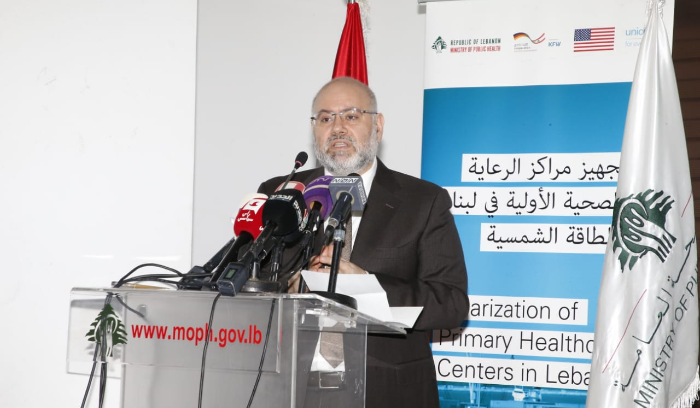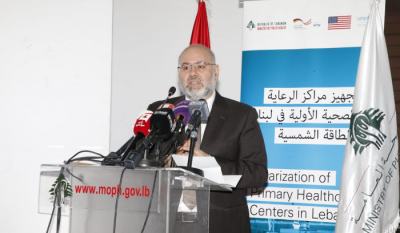On Tuesday, the Ministry of Public Health and UNICEF announced the equipping of 150 primary healthcare centers across various regions in Lebanon with solar energy to ensure the continuity of vaccination services, along with other essential primary healthcare services amid increasing power outages. With funding support from Germany through the German Development Bank and the United States government, UNICEF will begin the implementation of the solar energy project for these centers in March, aiming to complete the work by the end of May 2023.
This announcement was made during a meeting at the Ministry of Public Health attended by Minister Firas Al-Abed along with U.S. Ambassador to Lebanon Dorothy Shea, German Ambassador Andreas Kindl, UNICEF Representative in Lebanon Edward Begbie, and Dr. Randa Hamada, head of the Primary Healthcare Centers Department at the Ministry of Public Health, among others.
Minister Al-Abed affirmed that “the project addresses a core aspect of the national health strategy launched four weeks ago, concerning shifting our health sector's reliance from unsustainable resources to more sustainable ones and focusing on prevention.”
He stated, “I believe that the sustainability of primary healthcare centers achieves this goal as we have supported over two hundred and seventy healthcare centers in the past two years. However, ensuring sustainability in the energy sector specifically is crucial, and this support comes at a critical stage to grant healthcare centers a certain degree of independence that enables them to continue their services.”
The Minister of Public Health praised the ongoing support Lebanon receives from the international community, noting that “it does not only target the refugee community but also the Lebanese community at the same level.” He added, "Regardless of this support, the primary responsibility for reforming the health sector lies with Lebanon and its ministries."
He continued, “The issues of accountability and building trust are essential pillars. I am confident that the national health strategy, which was developed with significant local and international consulting efforts, outlines a clear vision and a roadmap to restore this trust.” Al-Abed emphasized the need to demonstrate intention as well as willpower, pointing out that “actions speak louder than words.”
He said, “Amid the chaos and turmoil affecting various sectors in Lebanon, the healthcare network has continued to provide effective services, and healthcare workers have exerted tremendous efforts proving themselves to be true heroes.”
He went on to highlight that “the crisis we are experiencing has revealed that the systems we previously operated on are no longer suitable, and we must find better alternatives. Therefore, what is being done is not merely addressing the situation from a temporary, limited perspective but instead from a comprehensive and strategic vision aimed at reforming the health system to emerge with a stronger system capable of serving people better; this is where the true legitimacy of any state lies.”
In turn, UNICEF Representative in Lebanon Edward Begbie stated, “This investment will lead to improving basic healthcare services for children. It is essential to keep vaccines at the appropriate temperature to ensure their effectiveness, and solar-powered electricity is critical to ensuring the safety of vaccines and supporting primary healthcare centers in continuing their immunization services alongside other basic health services.”
He added, “For many years, UNICEF, through its partnership with the Ministry of Public Health, has provided routine essential vaccines while maintaining the quality and effectiveness of health supplies and ensuring the protection of children from life-threatening diseases.”
The German ambassador praised the project of equipping several healthcare centers with solar energy as it achieves independence in the health sector from the other crises Lebanon suffers from, especially the electricity crisis, stating, “Although this investment is limited, it yields significant benefits.”
In her remarks, U.S. Ambassador Dorothy Shea reaffirmed the United States' commitment to the Lebanese people, particularly those suffering from difficulties due to the economic crisis exacerbated by the COVID-19 pandemic and subsequently the cholera epidemic. She said, “International parties continue to work with national authorities to face the difficult circumstances,” commending Minister Al-Abed for his efforts to address various health crises in Lebanon.
A statement issued by UNICEF indicated that the solar energy project follows the updating of the cold chain network with over 900 devices powered by solar energy to enhance the immunization program, serving as a primary entry point for primary healthcare and ensuring the safety of vaccines through an effective and reliable cold chain. It will help the network of primary healthcare centers under the Ministry of Public Health to operate its essential functions using solar energy wherever possible, thereby ensuring the continuity of immunization services and other primary healthcare services so that no child misses life-saving vaccinations.
The statement further clarified, “The solar energy systems will have a direct and positive impact on the environment and climate, in addition to reducing the operational costs of generators like purchasing diesel. The primary energy load for primary healthcare centers will rely on solar energy. It is known that solar energy produces no carbon dioxide emissions, and lifecycle assessments show it has a smaller carbon footprint 'from cradle to grave' compared to non-environmentally friendly energy sources.”
The statement emphasized the need for uninterrupted delivery of national routine vaccinations and basic primary healthcare services. Vaccination remains the primary entry point into primary healthcare and one of the most effective public health interventions; missing routine vaccinations increases the risk of disease outbreaks.




